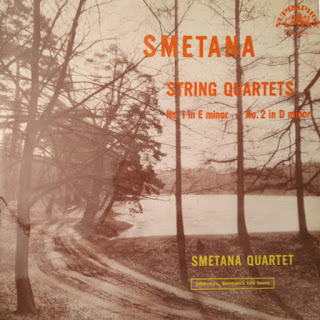Somewhere along the way I acquired a disproportionate fondness for Czech classical music, a predilection which has led me to pick up several LPs on the Czech (or, formerly, Czechoslovak) record label Supraphon. Currently I have about a dozen of them. This release of Bedřich Smetana's two string quartets, appropriately performed by Smetana Quartet, seems to have first been issued in 1964, mine being a later (possibly early '70s) export version with English, Russian, German and French text on the back.
The text explains that the first quartet, subtitled 'From My Life', and written in 1876, is a kind of autobiography in music, and quotes the composer's own remarks about how the first movement is a statement of "the artistic leanings of my young days" and "romantic feelings music, love and life in general"; that the second depicts his carefree youth as a travelling musician; the third concerns his first love for the woman who would become his wife; and the fourth begins triumphantly with his having found fame and recognition as a composer but then, introduced with a long and piercing high-pitched violin note, recounts his despair at the advent of his deafness.
Even not knowing the background to the music, it's a compelling work, with obvious sense of drama to it. The second quartet, was written in defiance of medical advice in 1882-3, when the composer was beset by worsening illness, isn't so easy to grasp. It too apparently has an autobiographical dimension, and, according to Smetana, "represents the turbulence of music in a person who had lost his hearing". The result is an unconventional and disconcertingly restless piece. The sound quality of the recording is a little thin - no surprise given its age - but the record itself is in great shape. I think it may have been one I picked up from the Oxfam shop in Thornbury.

Comments
Post a Comment